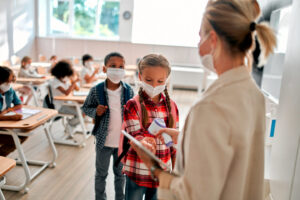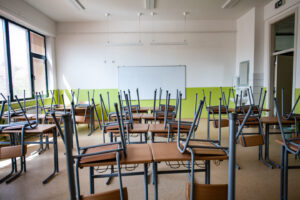Toxic lead discovered in Asheville, North Carolina schools’ water
Asheville public schools still don’t have clean water, city officials have reported.
On Thursday, Clay Chandler of Asheville’s Water Resources Department (WRD) said a Nov. 7 test…

Asheville public schools still don’t have clean water, city officials have reported.
On Thursday, Clay Chandler of Asheville’s Water Resources Department (WRD) said a Nov. 7 test found lead in the water of public elementary schools in both the city of Asheville and Buncombe County, as well as one private school, reported local media.
Exposure to lead can damage the brain, soft tissues, organs and blood. It can be fatal.
The lead was attributed to old piping and the WRD’s inability to treat the water for nearly three weeks after Hurricane Helene devastated the area.
One Asheville resident anonymously told The Lion the lack of clean water was one of the worst effects of the hurricane, which hit North Carolina back on Sept. 27. The resident said they didn’t have running water at all for “three solid weeks,” and even once it returned it was barely usable.
“You pretty much cannot do anything with it besides flush toilets,” the source told The Lion at the end of October. “And we have not been told at all when that will be rectified, [when] we can actually have usable, drinkable water.
“They say it’s safe to shower in, but the water that’s coming out of our faucets at this very moment is brown, and it’s filled with so much chlorine that when it hits your sink, it bubbles up.”
She said a lack of communication from the city of Asheville has also been discouraging.
“We were not informed really of anything. We were in the dark for, I would say, the first two weeks. The city of Asheville has a very high budget to keep things up and running and updated. And I’m aware that we got hit with a historical storm, but to be out of water for this long and then still not be told when it’s going to be rectified has been really disheartening [and] unsettling, because water is the one resource we have to have to live.”
Now, nearly two months later, city officials maintain the water is finally clean, having lifted the boil water notice on Monday morning.
Chandler thanked residents for “hanging in there with us” but still advised people to avoid usually large quantities of water such as filling bathtubs or landscaping.
“The use of treated water, combined with customer usage, has given us data that we feel is sufficient to reach the conclusion that the system has, for the most part, turned over, and the vast majority of water has been replaced with treated water,” said Chandler.
However, it’s unclear if schools will have safe water, as lead is entering their water through buildings’ internal plumbing.
Accordingly, students are not allowed to drink tap water, water fountains have been shut off, and no food is being served that requires water to prepare.



